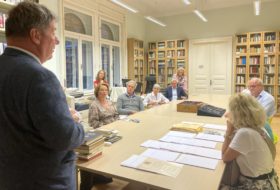One of Germany’s leading political newspapers features a full-page article about our Foundation in the Easter issue of the Frankfurter Allgemeine Sonntagszeitung. The piece outlines the life of Otto von Habsburg, highlighting his decades-long efforts to promote the idea of uniting our continent. Additionally, Löwenstein provides details about the fate of the politician’s legacy.
To the rather logical question of why Hungary has become the home of this priceless corpus of historical and political documents, the journalist offers the following provocative answer: the family lacked the necessary means, while the CSU did not deem it important enough – and Austria’s relationship with the Habsburgs is still fraught with controversy. It was therefore no surprise that the Hungarian Prime Minister, who had a clear vision of how the heritage should be preserved and processed, seized the opportunity. He presented the successors with the arrangement laid down in the law unanimously adopted by the Hungarian Parliament in 2016. A significant symbolic aspect of this is that the Foundation will soon be permanently housed in the Buda Castle. Löwenstein quotes the current head of the family, Karl von Habsburg, stating that this vision, which the family saw as an ”unrefusable offer”, was more appealing than alternatives in St. Pölten and Klosterneuburg in Lower Austria or even Stanford University in California, which also holds the legacy of many important members of the Austrian School of Economics.
His father’s ties to Hungary were a defining factor throughout his life: from the coronation in the Matthias Church (December 1916) to the time spent in Gödöllő during the final days of the Monarchy (autumn 1918), through the years of exile, the Benedictine teachers of Pannonhalma, and the Hungarian school-leaving examination (1930). Several decades later, considering the influence he had on the dismantling of the Iron Curtain and the regime change (1989/90), and, as a fitting conclusion, in Hungary’s accession to the European Union (2004), Otto von Habsburg is an inescapable figure in our 20th and 21st century history.
“This is fundamentally about modern Hungary,” emphasised Gergely Prőhle, director of the Foundation. He added that in the worldview of our eponym, the 800-year history of Central Europe and the Habsburg family are inextricably interwoven in an ideological and political tapestry in which the global political horizon of imperial thought and the nuances of the approach that regards the peoples and nations of our region as value-bearing communities complement each other harmoniously.
The full article can be read by clicking here.


